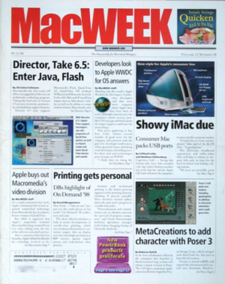 MacWEEK cover dated 5 November 1998 | |
| Type | trade journal |
|---|---|
| Format | Paper and online magazine |
| Owner(s) | Michael Tchong, John Anderson, Glenn Patch, Dick Govatski, and Michael F. Billings and from 1988 Ziff-Davis |
| Founded | 1987 |
| Language | English |
| Ceased publication | 1999 |
| ISSN | 0892-8118 |
| Website | defunct |
MacWEEK was a controlled-circulation weekly trade journal that focused on the Apple Macintosh.[1] MacWEEK was based in San Francisco and founded by Michael Tchong,[2] John Anderson, Glenn Patch, Dick Govatski, and Michael F. Billings. It featured a back-page rumor column penned by the pseudonymous Mac the Knife.[3]
Founded in 1987, it was acquired by Ziff-Davis in 1988. In 1998, as part of a strategy change, the print publication was relaunched as eMediaWeekly,[1] which caused a number of its existing sponsors to withhold their advertising. eMediaWeekly was published from August 24, 1998[4] to February 1, 1999.[5] The online edition of MacWEEK continued for several years, originally under the editorial management of MacWEEK staff members and later under the management of former Macworld editors. It was later shuttered in favor of Mac Publishing's Macworld and MacCentral sites.[6]
Rumors about Apple and its products were often published in MacWEEK which essentially became the source of record.[7] Apple employees, following the example of executive Jean-Louis Gassée, at times referred to it as "MacLeak", yet some relied on it to distribute information they could not officially disclose, to draw internal corporate attention or funding to their projects, or to find out what was happening in their own company.[8][9]
References
- ^ a b "MacWeek gives up the ghost". CNET. Retrieved 2017-06-02.
- ^ Armstrong, David (1 May 1994). "Ziff Happens". Wired. Retrieved 22 September 2021.
- ^ Egnst, Adam (5 March 2001). "MacWEEK to Roll into MacCentral". TidBITS. Retrieved 12 October 2021.
- ^ Engst, Adam C. (May 18, 1998). "Farewell MacWEEK, Welcome e/media Weekly". TidBITS. TidBITS Publishing, Inc. Retrieved July 30, 2009.
- ^ Engst, Adam C. (February 8, 1999). "eMediaweekly Folds After Five Months". TidBITS. TidBITS Publishing, Inc. Retrieved July 30, 2009.
- ^ Engst, Adam C. (March 5, 2001). "MacWEEK to Roll Into MacCentral". TidBITS. TidBITS Publishing, Inc. Retrieved July 30, 2009.
- ^ Snell, Jason (1 April 2016). "Remembering the early, glorious Mac web". Tech. The Verge. Retrieved 22 September 2021.
- ^ Cohen, Peter (5 June 2015). "Developers and customers need better communications from Apple". iMore. Retrieved 12 October 2021.
- ^ Guglielmo, Connie (25 May 2012). "Apple Loop: The Week In Review". Forbes. Retrieved 12 October 2021.
